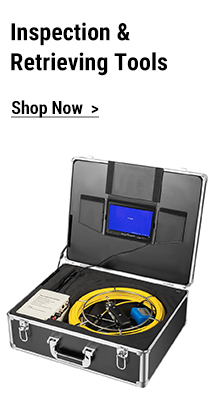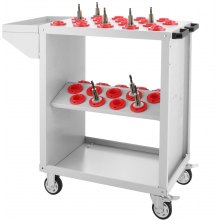Beyond The Garage: Exciting Uses Of VEVOR's Tool Carts in Unlikely Places
Tool carts, formerly relegated for wrenches and pliers, have made their way out of the garage to a broader world. Taking on the role of organization and efficiency-driving, tool carts are now highly regarded across many industries.
Following their increased necessity, VEVOR has joined the world in revolutionizing tool carts beyond old, squeaky boxes. Integrating innovations and making them from premium materials, tool carts’ suitability in many settings increased.
Modern features have further increased the ways tool carts are used. With features like portability and safe storage, tool carts are soaring to new heights, presenting themselves as mobile workshops!
Applications Of Tool Carts
Tool carts are versatile and indispensable assets that provide value across different sectors. With their adaptability, efficiency, and organizational prowess, they increase the outlook of many places and enhance productivity.
Healthcare Facilities
Quick access and mobility are essential in hospitals, clinics and other healthcare facilities. Having to search for necessary equipment when there is an emergency does not only show unprofessionalism, it can reduce the patient's chance of.
Fortunately, tool carts can help hospitals get their operations under control. A well-organized tool cart can help a medical practitioner navigate his way faster and more efficiently. Some tool carts can also serve as mobile medical stations for outpatient care.
The medical industry values easy accessibility to their tools, as it can make the difference between life and death. Tool carts help medical practitioners easily access the tools they need. Medical experts also use portable tool carts as mobile workstations.
Manufacturing and Industrial Facilities
Manufacturing and industrial facilities organization and efficiency are necessary in the manufacturing industry. Fortunately, workers can use tool carts to easily access their tools and get their work done seamlessly.
Workshops
Automotive, metalworks, and art workshops, among others, find great uses for tool carts. Tool carts present a way for them to efficiently organize their tools, reducing clusters in the workshop.
It also helps workers to easily access their tools, increasing their work efficiency.
Educational Settings
Schools and educational institutions use tool carts to store teaching aids, classroom supplies and important documents. They also use them to transport tools within the building, increasing teaching flexibility.
Other places you can find a tool cart include laboratories, construction sites, the hospitality industry, art studios, homes, DIY spaces, etc.
Different Materials For Tool Carts
Manufacturers make tool carts from many material types. Each of these materials has unique properties and advantages, making them suitable for various purposes.
The tool cart’s material choice can affect its overall properties like weight, durability, adaptability, sterility, and corrosion resistance.
Therefore, you must carefully consider the tool cart’s features before choosing only the one that can suit your needs.
Steel And Aluminium
Steel and aluminum are standard for making tool carts due to their durability. Steel can withstand heavy loads, making it an excellent protection for tools.
Aluminum is lightweight and corrosion-resistant. Both are suitable for industrial settings where durability is essential and aluminum guarantees further portability.
Plastic
Plastic toolboxes are lightweight, corrosion-resistant and affordable. They are suitable for transporting smaller tools in lighter applications like classrooms, offices, and medical settings. They are easy to maintain but not as durable.
Fiberglass
Fiberglass is a great toolbox material option in the electrical industry. It is non-conductive, lightweight, durable, and resistant to corrosion.
Wood
Wood is a natural insulator with artistic looks, making it suitable for artistic study, woodworking workshops, etc. Wood is lighter than steel, and you can customize it with various finishes.
Future Innovations And Technologies In Tool Carts
Technological advancements and innovative designs are significant drivers for changes in the tool cart industry. Relying on the perceived needs and wants of consumers, manufacturers continually change the trajectory of tool storage.
Here are some innovations that we are currently experiencing in tool carts, and we expect their more developed versions in the future.
Power and Charging Stations
Tool cart manufacturers are currently considering eliminating the need for external power sources. With the aim to transition tool carts into mobile workstations, they now contain power outlets that enable workers to charge their devices and power electronic devices without waiting for external power sources.
These tool carts can use batteries to retain energy and contain lighting for extra visibility.
Modular Design
Manufacturers now adopt modular designs, enabling workers to change things around in a tool storage. These designs allow easy customization of the tool carts with interchangeable drawers, shelves and dividers. This feature further increases the versatility and adaptability of the tool carts.
Enhanced Security Features
Tool cart manufacturers recognize tools as investments, doing their best to help owners secure them. There are currently improvements in the security features of tool carts. The future outlook promises a more digitally secured tool cart.
There will be increased use of biometrics, enabling only the programmed person to open the cart with fingerprint, voice, iris, or facial recognition.
Why Choose VEVOR?
VEVOR’s interest in tool carts is more immersive than what many expect. As a manufacturer of tools and equipment, VEVOR greatly understands its role in people’s productive lives. Knowing what it takes to make a tool and how much people consider them an investment is enough to nudge VEVOR into giving the tools the best housing possible.
Therefore, VEVOR’s tool carts are effective tool storages made from high-quality materials, using excellent craftsmanship. VEVOR helps ensure the safety of your tools by equipping our tool carts with adequate security measures. Taking it further, we also invest in state-of-the-art technology to make your tool carts reliable in today’s world.
VEVOR understands versatility, enabling us to diversify our tool carts’ features to make them suitable for different uses. VEVOR’s tool cart portability and accessibility are all you need to take your office anywhere in today’s fast-paced world.
FAQs About Tool Carts
Can tool carts be used in cleanroom environments?
Yes, you can use a tool cart in a cleanroom environment. Choose a tool cart that is made from a material that you can easily clean and sanitize, like stainless steel or fiberglass. Also, ensure the tool cart meets the strict cleanliness and hygiene requirements for your field.
How do I maintain a tool cart?
Clean your tool cart regularly to maintain it. Also, lubricate the moving parts regularly to prevent stiffness. Check regularly for damages, wear and tear and promptly fix them. You can further check the manufacturer’s guide for other maintenance requirements and follow them.
How do I choose the right tool cart for my needs?
To choose the right tool cart for your needs, consider what you need it for and the types of tools you will store. Consider the material they made it from, locking mechanism, available technology, design, size and portability.










































































